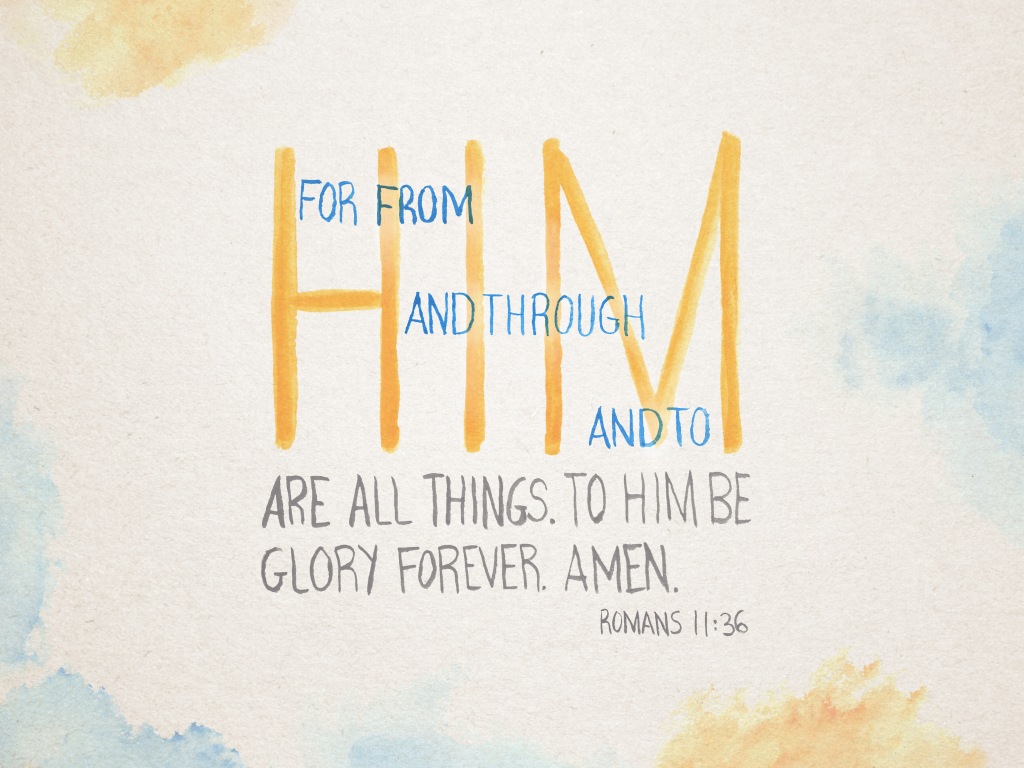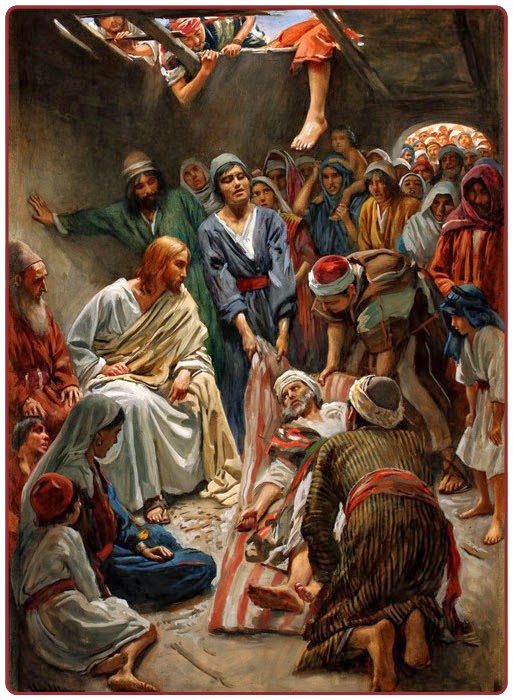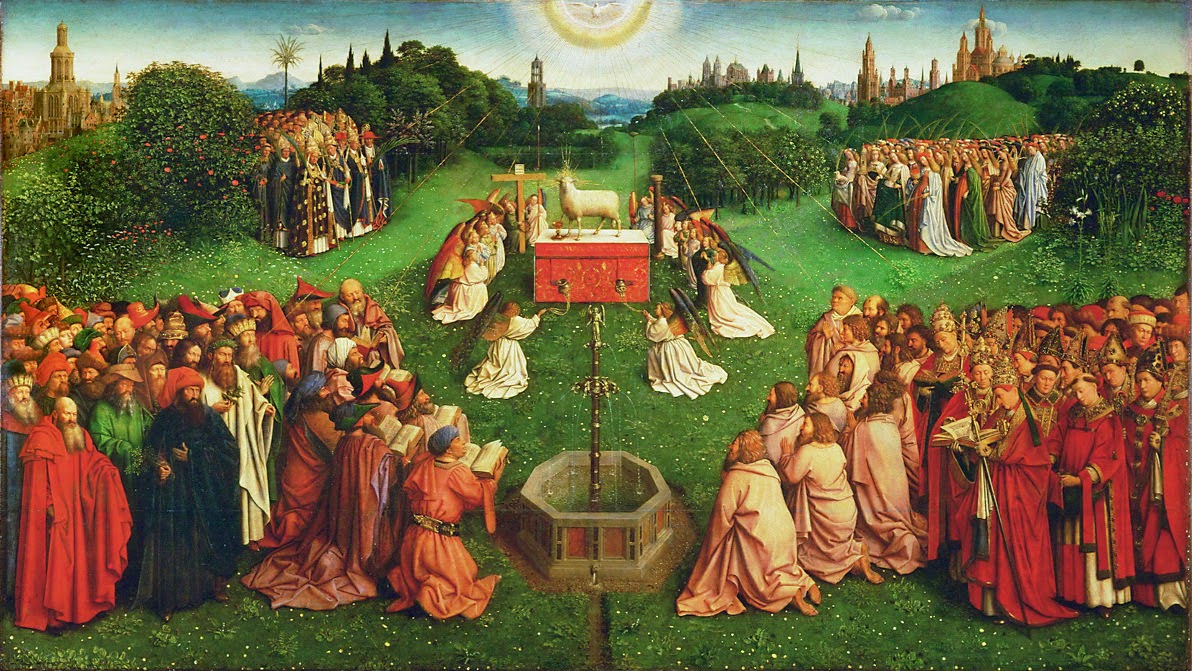
Romans 11:33–36
33 Oh, the depth of the riches
and wisdom and knowledge of God!
How unsearchable are his judgments
and how inscrutable his ways!
34 “For who has known the mind of the Lord,
or who has been his counselor?”
35 “Or who has given a gift to him
that he might be repaid?”
36 For from him and through him and to him are all things.
To him be glory forever. Amen.
In the name of the Father and of the Son and of the Holy Spirit. Amen.
Who has seen the ocean? Probably everyone has seen the ocean. If you haven’t, I can show you a picture or video after the service and, technically, you will have seen the ocean. But a picture or video doesn’t do the ocean justice. It isn’t the same as seeing it in person with your own eyes. So, how many of you have been to the ocean and have seen it, smelled it, and felt it?
Now, which ocean(s) – the Pacific, Atlantic, Indian, Arctic, Antarctic? Maybe you have seen each of them, but how much of them have you seen? Did you see a bit of it from a beach? Have you been on a boat where no land is in sight? “Water, water everywhere and not a drop to drink.” Even then, you only saw just shy of three miles of ocean before the curve of the earth pulled the rest of it away from your sight. And your field of vision only allowed you to see so much without turning your head or spinning around in circles, which, if you are prone to seasickness, is not something I would recommend. And even if you’ve been so far out to sea that no land was in sight, you can only say that you’ve skimmed the surface of the ocean – literally.
Have you seen what’s in the ocean and on its floor? Have you been able to snorkel or scuba dive to see what’s down there? How deep have you gone? Twenty, fifty, one-hundred feet? I have one friend who has dived to somewhere near that depth. As far as I know, I don’t know anyone who has been 1,000 feet below the surface of the ocean. The average depth of the ocean is about 2.3 miles deep. Some people have gone that deep. But think about the deepest part of the ocean, Challenger Deep, which is nearly 7 miles below sea level. Twelve people have walked on the moon, but only three have ever been down there.
Many people have gone up into space, orbited the planet hundreds of times, and have seen the majority of the oceans’ surface. But they haven’t been through all the oceans at all the depths to see what lies underneath the surface. So, I ask again, have you seen the ocean? Ultimately, no one can claim to have seen the oceans in their entirety. The best anyone can accurately say is, “I’ve seen a tiny fraction of the ocean.” The oceans are too big, too wide, too deep for anyone to see very much of it. But still, we wouldn’t call someone a liar if they said that they have seen the ocean. To see part of it is to truthfully say that you’ve seen it.
All of that is to set this up: These verses come at the tail end of Paul’s main theological treatise in Romans. In the first eight chapters, Romans is a thorough skimming of the surface of theology. It has dealt with the fact that no one is righteous in the way that God demands. Because of that everyone deserves death and condemnation. But God, in His mercy, has delivered the very righteousness He demands to those who have faith in Christ. By believing that God has come in the flesh of Jesus; believing that Christ suffered, bled, and died; and believing that He rose again for you, you are righteous – as righteous as Jesus is righteous.
Then, Paul dives deeper into the depths of the theological ocean. He writes about how God delivers that faith through His gracious choosing of you. Inspired by the Holy Spirit, Paul talks about the doctrines of election and predestination. Believer, you are saved exclusively because of what God has done. Jesus has done the work to deliver, rescue, and save you from your sin. The Holy Spirit has called you through God’s Word, given you faith to believe, and will sustain your faith as He works through the Scriptures (Ro. 10:17). Your salvation is entirely based on God’s mercy (Ro. 8:29-33) and the fact that He chose you to be in Christ from before the foundation of the world (Eph. 1:4-5). The culmination of Paul’s short dive into the doctrine of predestination comes in the verse just before this text where his conclusion is, “God has consigned all to disobedience, that He may have mercy on all” (Ro. 11:32).
Now, the doctrine of predestination is a huge topic, and I’m not going to go into it today. I have preached on it the past. And if you ever have questions about it, please feel free to talk with me. (I enjoy having any theological conversations.) The only reason I mention predestination here is to set up the context of the praise that we heard in this reading. God’s mercy in delivering salvation to us unworthy sinners leads to this doxology, this song of praise that is our reading: “Oh, the depth of the riches and wisdom and knowledge of God! How unsearchable are His judgments and how inscrutable His ways!”
Whenever we study theology, no matter what branch of theology is being studied, we come to a point where we realize the simple truth that God is bigger than us. God has revealed much to us in His Word, but He hasn’t revealed everything. His riches, wisdom, and knowledge go to a depth that we cannot reach. His ways are inscrutable and inconceivable. It isn’t just that they are hard to understand they are far, far beyond our comprehension. Just like how you’ve only seen a small sliver of the ocean, but you haven’t seen the whole thing. The more I study theology and the Bible, the more I realize there is to learn. It’s a regular occurrence for me to be reading a passage and suddenly realize, “I’ve never noticed that before.” Christian, there’s always more to be learned and meditated on when it comes to theology and the Bible. More and more and more and more. And it is always a joy and delight to discover more.
Today is Holy Trinity Sunday which ends the festival half of the Church year which began in Advent. The Advent, Christmas, Epiphany, Lent, Easter, and Pentecost seasons focus on God’s work for us by coming, declaring, suffering, dying, rising, ascending, and sending the Holy Spirit. Now, on Trinity Sunday, we recognize that the work of our salvation is exclusively brought about by the plan and efforts of the one God who is Father, Son, and Holy Spirit. So, Trinity Sunday is a fitting time to pause, step back, and simply praise God for all He has done, accomplished, and delivered to us. Even though we’ve spent the past six months considering what God has done to save us, we’ve just barely scratched the surface. Even when we do it again and again, there is still more.
We can’t know God’s mind. We can’t advise Him. We can’t give or offer anything to Him. That’s why Paul closes in v. 36 with this doxology, “From Him and through Him and to Him are all things.”
Consider each of those in order. “From Him,” God the Father is the source and Creator of all things. “Through Him,” God the Son has set all things in order and gives them to us. “And to Him,” the God the Holy Spirit directs all things so they find their end and meaning in this one God.
Rejoice because this One unfathomable, inscrutable, inconceivable God took it upon Himself to create, redeem, and sanctify you. So, “to Him be glory forever.” In the name of the Father and of the Son and of the Holy Spirit. Amen.
The peace of God, which surpasses all understanding, will guard your hearts and minds in Christ Jesus. Amen.





 2 And behold, some people brought to him a paralytic, lying on a bed. And when Jesus saw their faith, he said to the paralytic, “Take heart, my son; your sins are forgiven.” 3 And behold, some of the scribes said to themselves, “This man is blaspheming.” 4 But Jesus, knowing their thoughts, said, “Why do you think evil in your hearts? 5 For which is easier, to say, ‘Your sins are forgiven,’ or to say, ‘Rise and walk’? 6 But that you may know that the Son of Man has authority on earth to forgive sins”– he then said to the paralytic – a “Rise, pick up your bed and go home.” 7 And he rose and went home. 8 When the crowds saw it, they were afraid, and they glorified God, who had given such authority to men.
2 And behold, some people brought to him a paralytic, lying on a bed. And when Jesus saw their faith, he said to the paralytic, “Take heart, my son; your sins are forgiven.” 3 And behold, some of the scribes said to themselves, “This man is blaspheming.” 4 But Jesus, knowing their thoughts, said, “Why do you think evil in your hearts? 5 For which is easier, to say, ‘Your sins are forgiven,’ or to say, ‘Rise and walk’? 6 But that you may know that the Son of Man has authority on earth to forgive sins”– he then said to the paralytic – a “Rise, pick up your bed and go home.” 7 And he rose and went home. 8 When the crowds saw it, they were afraid, and they glorified God, who had given such authority to men. Jesus is here, here to give you exactly what you need. He comes to give you His Body which was hung on a cross to endure the wrath of God for your sins. He comes to give you His Blood which He shed for the forgiveness of your sins. Whatever your problem is – even if you are unclear what it is – Jesus is here to deliver you from it. Amen.
Jesus is here, here to give you exactly what you need. He comes to give you His Body which was hung on a cross to endure the wrath of God for your sins. He comes to give you His Blood which He shed for the forgiveness of your sins. Whatever your problem is – even if you are unclear what it is – Jesus is here to deliver you from it. Amen. 2Above him stood the seraphim. Each had six wings: with two he covered his face, and with two he covered his feet, and with two he flew. 3And one called to another and said:
2Above him stood the seraphim. Each had six wings: with two he covered his face, and with two he covered his feet, and with two he flew. 3And one called to another and said: Hebrews 12[:22–23]tells us that there are many more here today than our eyes can see, “But you have come to Mount Zion and to the city of the living God, the heavenly Jerusalem, and to innumerable angels in festal gathering,and to the assembly of the firstborn who are enrolled in heaven, and to God, the judge of all, and to the spirits of the righteous made perfect.”
Hebrews 12[:22–23]tells us that there are many more here today than our eyes can see, “But you have come to Mount Zion and to the city of the living God, the heavenly Jerusalem, and to innumerable angels in festal gathering,and to the assembly of the firstborn who are enrolled in heaven, and to God, the judge of all, and to the spirits of the righteous made perfect.”
You must be logged in to post a comment.